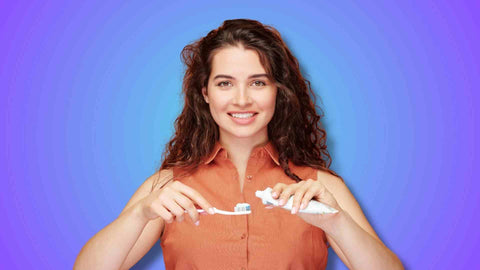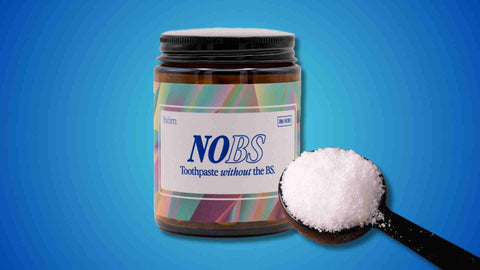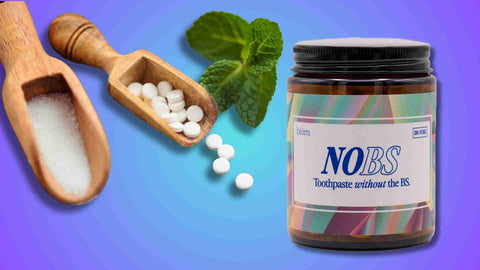Does Glycerin Prevent Tooth Remineralization?
No, glycerin is generally not considered to prevent tooth remineralization. The claim that glycerin prevents tooth remineralization is a topic of debate and lacks substantial scientific evidence to be considered a fact.
Remineralization is the natural process by which minerals, such as calcium and phosphate from saliva, are redeposited in the tooth enamel after they have been removed by acids. This process is crucial for repairing early enamel erosion and preventing cavities.
Glycerin is used in toothpaste primarily for its humectant properties, meaning it helps retain moisture and prevents the product doesn't dry out and maintains a pleasant texture.
At the same time, some people have expressed concerns that glycerin might coat the teeth, creating a barrier that could potentially interfere with the remineralization process by preventing saliva from coming into direct contact with the enamel.
However, there is no conclusive research to support the idea that glycerin significantly hinders remineralization. Most dental professionals agree that the benefits of using toothpaste, including those containing glycerin, for cleaning and maintaining oral health outweigh any potential negatives.
In this article, I'll explain everything you need to know about glycerin and tooth remineralization.
Why is glycerin included in toothpaste?

Glycerin is included in toothpaste for several important reasons, largely for its ability to improve the functionality and user experience of the product.
Let's walk through some of the key reasons glycerin is in toothpaste.
Moisture Retention
Glycerin is a humectant, which means it helps retain moisture.
In toothpaste, it prevents the product from drying out, ensuring it remains smooth and easy to spread on your toothbrush.
This moisture retention is crucial for maintaining the toothpaste's consistency and usability over time, making it more effective and pleasant to use with each application.
Texture and Smoothness
Glycerin contributes to the smooth, gel-like texture of toothpaste, making it more palatable and comfortable to use. It helps the toothpaste glide over your teeth and gums, enhancing your brushing experience.
This smooth texture is particularly important for encouraging regular brushing habits, as it makes the process more enjoyable and less abrasive on your mouth.
Carrier for Active Ingredients
Glycerin serves as an effective carrier for the active ingredients in toothpaste, such as fluoride, which helps prevent tooth decay, and other agents aimed at whitening, reducing sensitivity, or fighting gum disease. By evenly distributing these ingredients throughout the toothpaste, glycerin ensures that they are effectively applied to all areas of the mouth during brushing. Where does glycerin come from?
Is glycerin in toothpaste safe?

Yes, glycerin in toothpaste is safe for use in toothpaste and other oral care products.
While some people worry about the development of glycerin coating on teeth leading to dry mouth, the safety of glycerin in natural toothpaste and other personal care products is well-established, and it is recognized as safe by major health and regulatory agencies around the world.
In fact, one of its key benefits of its antimicrobial and antiviral properties.
Its inclusion in toothpaste formulations helps ensure the product remains effective and pleasant to use, contributing to a better oral hygiene routine.
However, as with any product, some individuals may have specific sensitivities or allergies to certain ingredients, including glycerin, although this is rare. If you have concerns about glycerin or any other ingredient in your toothpaste, make sure to try glycerin-free toothpaste instead.
So, is glycerin bad for our teeth?

No, glycerin is not inherently bad for teeth.
Widely found in personal care products, glycerin is anti-microbial and included in toothpaste as a safe and affordable preservative.
At the same time, glycerin functions like an occlusive and may leave a film on your teeth. This film can prevent the remineralizing agents in the toothpaste from getting into your enamel. Over time, this process could potentially exacerbate tooth decay and cavities.
That being said, there is no conclusive evidence that glycerin is bad for your oral health or contributes to conditions like gum disease, bad breath, or dry mouths.
Is it true glycerin impedes remineralization?

No, the idea that glycerin prevents the tooth remineralization process is not backed up clinical evidence.
Remineralization is a natural process where minerals like calcium and phosphate from your saliva fortify your tooth enamel, helping to reverse early signs of decay.
Some people worry that glycerin, a common ingredient in toothpaste for its moisture-retaining and texture-enhancing properties, could create a barrier on teeth that blocks these essential minerals from being absorbed.
However, it's important to understand that the scientific evidence to support the claim that glycerin impedes remineralization is limited. The majority of dental health professionals and research studies confirm the safety and effectiveness of glycerin in toothpaste.
That said, many people still prefer to avoid glycerin in toothpaste, which is reasonable. In these cases, be sure to check out glycerin free toothpaste.
Wait, is glycerin vegan?
Yes, glycerin can be vegan, but it depends on its source. When glycerin is derived from plant-based oils, such as soybean, coconut, or palm oil, it is considered vegan.
Many manufacturers opt for plant-based glycerin to accommodate vegan and vegetarian preferences, as well as for ethical and sustainability reasons. For example, our vegan toothpaste does not include any animal-based ingredients.
However, it's also possible for glycerin to be derived from animal sources, which would not be suitable for those following a vegan lifestyle.
Should I avoid glycerin in toothpaste?

Whether you should avoid glycerin in toothpaste depends on your personal preferences and oral health needs.
Glycerin is generally recognized as safe for use in oral care products by health authorities and dental professionals. That said, concerns about glycerin in toothpaste typically revolve around claims that it might coat the teeth and interfere with the natural remineralization process.
However, there is limited scientific evidence to support these claims. Most dental health professionals agree that the benefits of using toothpaste with glycerin, especially in terms of cleaning and maintaining oral hygiene, outweigh potential drawbacks.
If you have specific oral health concerns or preferences, such as using all-natural products or those with specific ingredients, you might want to consider using glycerin free toothpaste.
What's the best glycerin-free toothpaste?

NOBS Toothpaste Tablets are the best glycerin free toothpaste. One of the key reasons is that they're formulated as dry toothpaste tablets, eliminating the need for glycerin or other unnecessary ingredients.
Further, NOBS Toothpaste Tablets are formulated with nano hydroxyapatite, xylitol, zinc citrate, and baking soda. These are four key ingredients used to:
-
stimulate remineralization
-
support your oral microbiome
-
prevent plaque buildup
-
and remove surface stains.
Also, NOBS Toothpaste Tablets have a simple, clean ingredient list, featuring only 13 ingredients. This minimalist approach minimizes your risk of allergic reactions which can be a concern with other toothpastes.
Key Ingredients in To Look for in Glycerin Free Toothpaste
NOBS Toothpaste Tablets are a unique type of glycerin free toothpaste that is jam-packed with ingredients included to nurture your oral microbiome. This unique formula makes it the best toothpaste for canker sores.
Let's walk through some of these key ingredients.
Nano Hydroxyapatite
Nano hydroxyapatite (also known as nHA) is a synthetic form of hydroxyapatite, a naturally occurring mineral found in our teeth and bones. It's known for its similarity to the mineral component of our teeth, making it a valuable ingredient in remineralizing toothpaste.
Nano hydroxyapatite is created by breaking down hydroxyapatite into nanoscale particles, which are extremely small and have unique properties. Because of this small size, its primary benefits include its ability to:
-
remineralize tooth enamel
-
repair initial stages of tooth decay
-
strengthen the tooth structure
-
and soothe tooth sensitivity.
These benefits occur because when nano hydroxyapatite is applied to the enamel surface, it can bond with the tooth's natural hydroxyapatite, repairing and strengthening the enamel.
Studies suggest that nano hydroxyapatite is equally as effective as fluoride toothpaste at remineralization and preventing dental caries. Due to some of the concerns around fluoride toxicity, many people prefer nano hydroxyapatite as a better alternative to fluoride.
Xylitol

Xylitol in toothpaste is a sugar alcohol used as a natural sweetener and for its oral health benefits. Unlike traditional sugars, xylitol does not feed the bacteria in your mouth, which means it doesn't contribute to tooth decay.
In fact, xylitol actively fights against cavity-causing bacteria, like mutans streptococci, and can prevent tooth decay by inhibiting their growth and reducing their ability to create acids that erode our enamel.
This lowers our risk of developing dental caries and promotes good dental health. That said, xylitol cannot reverse cavities.
Further, xylitol stimulates saliva production, which is beneficial for our oral health. Saliva is our natural buffer against acids that can otherwise demineralize enamel and cause tooth decay.
Because of these properties, xylitol is considered one of the best ingredients in toothpaste. Plus, its naturally sweet taste also makes toothpaste more enjoyable use to without the harmful effects of sugar, making it a popular choice for both adults and kids toothpaste.
Zinc Citrate
Zinc citrate in toothpaste is an ingredient valued for its oral health benefits, particularly its role in fighting plaque and reducing bad breath.
Zinc is a naturally occurring mineral that, when formulated as zinc citrate, becomes an effective agent against the growth of bacteria in the mouth. These bacteria are responsible for plaque formation, gum disease, and the production of volatile sulfur compounds (VSCs) that lead to bad breath.
By inhibiting the growth of these bacteria, zinc citrate helps to reduce plaque buildup, decrease the risk of gingivitis (gum inflammation), and combat halitosis (bad breath). Its antibacterial properties make it a common addition to toothpaste and mouthwashes, enhancing their ability to maintain oral hygiene.
Additionally, zinc citrate can contribute to remineralizing tooth enamel, offering further protection against decay.
Sodium Bicarbonate

Baking soda, also known as sodium bicarbonate, in toothpaste serves as a gentle yet effective cleaner for your teeth, offering multiple benefits for your oral health.
Its mild abrasive qualities help scrub away surface stains from your teeth, contributing to a brighter, whiter smile without damaging the enamel. This makes baking soda toothpaste an excellent choice for daily use, especially if you're looking to remove stains caused by coffee, tea, wine, or tobacco.
Further, baking soda's natural alkalinity plays a crucial role in neutralizing the plaque acids in your mouth. These acids, produced by bacteria as they digest food particles, can erode tooth enamel and lead to cavities.
By keeping the oral environment more balanced, baking soda not only protects your enamel but also supports overall gum health.
Additionally, baking soda tackles bad breath by addressing its root cause: the acidic by-products of oral bacteria. By neutralizing these acids, baking soda helps freshen your breath, leaving your mouth feeling cleaner and more refreshed.
For those with sensitive teeth, brushing teeth baking soda toothpaste can be a gentler alternative, effectively cleaning without causing discomfort.
Frequently Asked Questions
How can I speed up my tooth remineralization?
To expedite tooth remineralization, you can implement several strategies. Firstly, maintain good oral hygiene practices, including regular brushing and expandable flossing to remove plaque and bacteria. Consider using remineralizing toothpaste containing ingredients like nano hydroxyapatite, which can aid in remineralization. Avoid excessive consumption of sugary and acidic foods and beverages, as they can contribute to demineralization. Additionally, ensure you're getting enough calcium and vitamin D in your diet, as these nutrients are essential for strong teeth. Finally, visit your dentist regularly for professional cleanings and assessments to monitor your progress and receive personalized recommendations.
Why avoid glycerin?
Avoiding glycerin might be recommended for individuals with sensitive skin or specific skin conditions such as eczema. Glycerin can draw moisture from the deeper layers of the skin, potentially causing dryness or irritation in some people. Moreover, in humid climates, glycerin may attract moisture from the air, leading to a sticky or uncomfortable feeling on the skin. While glycerin is generally considered safe and beneficial for many skincare products, those with skin sensitivities may opt for glycerin-free alternatives to avoid potential adverse reactions. Always consult with a dermatologist to determine the best skincare ingredients for your individual needs.
Why do they put glycerin in toothpaste?
Glycerin is commonly included in toothpaste for several reasons. It helps to give toothpaste its smooth and thick texture, allowing it to easily spread across the teeth and gums during brushing. Additionally, glycerin helps to prevent the toothpaste from drying out, maintaining its consistency throughout its shelf life. Furthermore, glycerin can also contribute to the overall mouthfeel of the toothpaste, making it more pleasant to use. While glycerin is generally considered safe for oral use, some individuals may have sensitivities to it, so it's always important to check the ingredients list if you have concerns.
Which dentifrice ingredient is proven most effective for remineralization?
The dentifrice ingredient proven most effective for remineralization is nano hydroxyapatite. Nano hydroxyapatite, a form of calcium phosphate, has been shown to effectively remineralize tooth enamel by depositing minerals back into the weakened areas, helping to restore its strength and resilience. Studies have demonstrated its ability to repair early-stage cavities and strengthen enamel, making it a promising ingredient in oral care products. Its nano-sized particles allow for better penetration into enamel pores, enhancing its remineralizing effects. As a result, toothpaste containing nano hydroxyapatite is becoming increasingly popular for promoting dental health and preventing tooth decay.
What ingredient remineralizes teeth?
The ingredient that remineralizes teeth is nano hydroxyapatite. Nano hydroxyapatite, a form of calcium phosphate, effectively deposits minerals back into weakened tooth enamel, restoring its strength and resilience. Studies have shown its ability to repair early-stage cavities and strengthen enamel, making it a promising component in oral care products. Nano hydroxyapatite's nano-sized particles allow for better penetration into enamel pores, enhancing its remineralizing effects. Consequently, toothpaste containing nano hydroxyapatite is increasingly recognized for promoting dental health and preventing tooth decay.
How can I remineralize my teeth naturally?
To naturally remineralize your teeth, focus on a diet rich in calcium from sources like dairy, leafy greens, and almonds. Include phosphorus-rich foods such as fish and nuts, as well as vitamin D sources like fatty fish and fortified dairy. Limit sugary and acidic foods to protect tooth enamel. Additionally, maintain good oral hygiene practices like brushing with remineralizing toothpaste, flossing daily, and staying hydrated with plenty of water to support saliva production, which aids in remineralization.






















